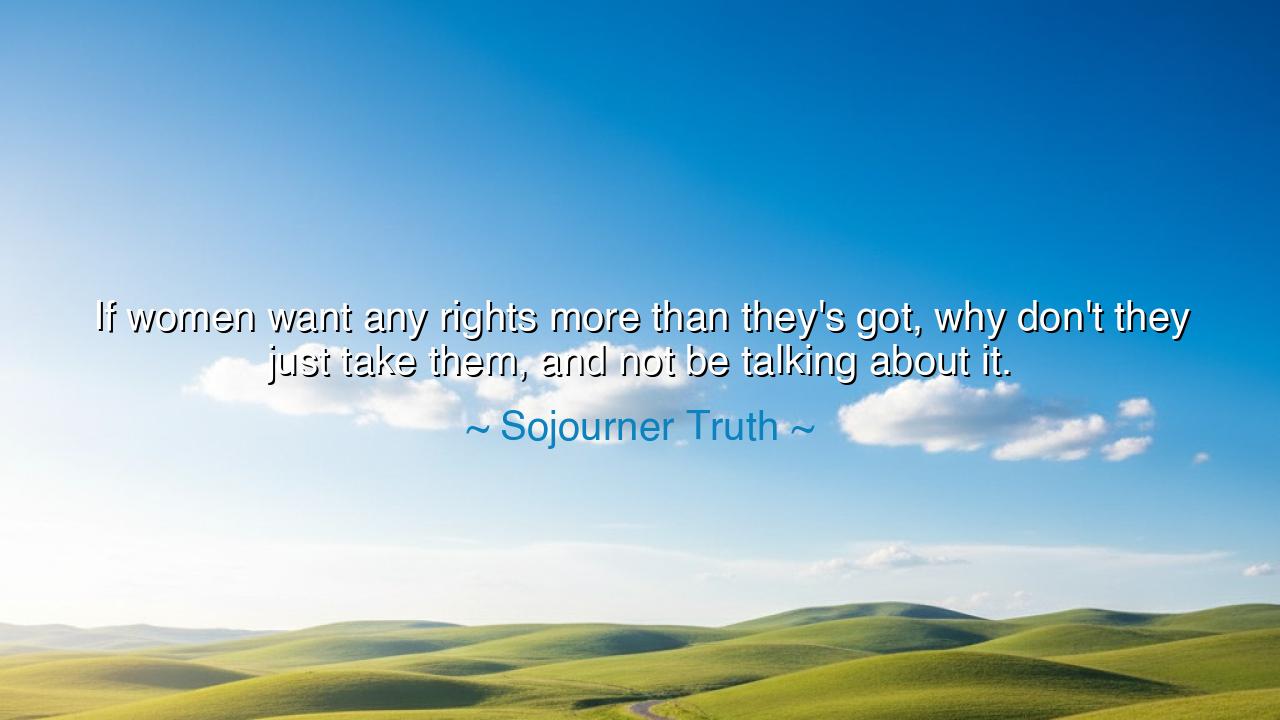
If women want any rights more than they's got, why don't they
If women want any rights more than they's got, why don't they just take them, and not be talking about it.






Hear the thunderous words of Sojourner Truth, prophetess of freedom and warrior of justice, who declared: “If women want any rights more than they's got, why don't they just take them, and not be talking about it.” These words, spoken in the plain speech of a former slave who knew suffering and struggle, strike with the force of a hammer upon stone. They cut through hesitation and demand action. Truth did not believe in waiting for permission from oppressors; she called upon women to seize what was already theirs by birthright: liberty, dignity, and equality.
The origin of these words lies in the mid-19th century, a time when Sojourner Truth traveled the land, speaking out against slavery and for women’s rights. Born into bondage, she knew firsthand the cruelty of being denied agency over one’s life. Yet she rose, not in bitterness, but in power, proclaiming that freedom is never given—it must be taken. When she addressed women demanding equality, she did not urge patience or timid speech. She urged boldness, the courage to act, to claim rights not as gifts from men, but as inherent truths of their humanity.
Consider, O listener, her most famous speech, Ain’t I a Woman? In it, she stood before an audience that doubted women’s strength and black women’s worth. She spoke of how she had plowed, planted, borne children, and endured the lash—doing all that men did, yet denied the recognition of womanhood. In her fiery declaration that women should not simply talk of rights but take them, she revealed her belief that justice is not delivered by words alone. It is seized by deeds, by courage, by relentless struggle.
History proves her vision true. The suffragettes who marched, protested, and even went to jail to secure the vote for women were not content with speeches. They took their rights through action, hunger strikes, and unyielding resistance. Likewise, in the civil rights movement a century later, women and men sat at segregated counters, marched across bridges, and defied unjust laws. Each act was a living echo of Sojourner Truth’s command: do not wait, do not beg—stand, rise, and claim what is yours.
Her words also carry warning. To talk without acting is to let injustice linger. To wait for permission from those who benefit from oppression is to wait forever. Truth had lived as property, stripped of freedom, and she knew the mentality of masters—they do not willingly surrender their power. Thus her call was urgent: if women wanted more than they had, they must have the fire to take it, for the gates of liberty do not swing open by politeness alone.
O seeker, the lesson is this: freedom is not a gift. Dignity is not a handout. Equality is not granted by the grace of others. They are the birthright of every soul, and when denied, they must be pursued with courage. To shrink from action, to linger only in talk, is to chain oneself anew. But to act, even against great odds, is to awaken the strength that no oppressor can hold down.
And what actions must we take? Begin in your own life: speak with courage, but also act with conviction. Where you see injustice, resist it not only in words but in deeds. Join with others, for the strong are strongest when united. Remember Sojourner Truth’s wisdom: do not wait for approval from the powerful; history has never been rewritten by the timid. Claim your space, demand your rights, and live as though freedom is already yours.
Thus remember her voice: “Why don’t they just take them?” Let this be more than a question—it must be a call to arms. For in every age, there are rights denied and freedoms delayed. And in every age, there must be those who rise with the courage of Sojourner Truth, who do not merely talk of justice, but seize it, and in seizing it, make the world anew.






GDGold D.dragon
While Sojourner Truth’s quote sounds empowering in one sense, I feel it oversimplifies the situation. Sometimes, talking about rights is the first step toward change. The struggles women face are often deeply entrenched in legal, economic, and cultural systems. How can we expect women to 'take' rights when they don’t have the platform or support to do so? Isn't the conversation necessary to build the groundwork for meaningful action?
TTThao Tran
This quote appears to be a call to action, but I wonder if it ignores the context of the time. Women were not just struggling for rights but often facing violent repercussions for demanding them. Could this quote be interpreted as a challenge to society to stop undervaluing the power of conversation and the importance of raising awareness in the first place? I think it's crucial to consider both action and dialogue in these discussions.
HTKieu Trang Hoang Thi
Sojourner Truth’s words seem to convey a sense of urgency for women’s rights, challenging the complacency of society. However, it also raises a question about the practicality of 'taking' rights. While self-empowerment is key, shouldn’t we consider the structural forces that keep certain groups, especially women, from easily achieving equal rights? I would love to hear what others think about the balance between action and discussion in fighting for equality.
THNguyẽn Thị Thanh Huyèn
This quote seems to suggest that if women truly want more rights, they should take action and not just talk about it. While this may sound empowering, I wonder if it's oversimplifying the issue. Are there not social, cultural, and legal barriers that prevent women from 'just taking' those rights? It also implies that talking about these issues is somehow less valuable, which doesn’t seem to be the case when advocacy and awareness are crucial for societal change.